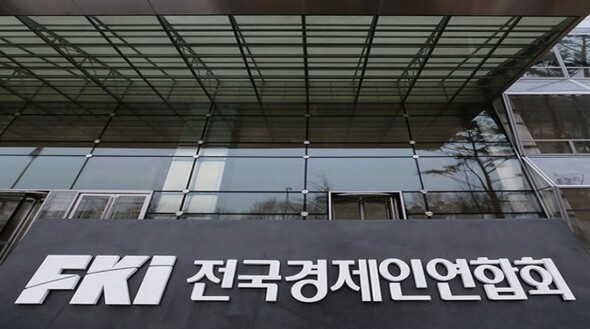hankyoreh
Links to other country sites 다른 나라 사이트 링크
FKI says shorting working hours could bring benefits

The Federation of Korean Industries (FKI) argued that shorter working hours bring four major benefits: improved quality of life for workers, increased employment, greater productivity, and better coexistence between labor and management.
While the position was premised on unions accepting lower wages, the break from the business interest group’s previous position rejecting working hour cuts because of the increased wage burden could mean the debate may heat up amid an ongoing restructuring trend.
On May 3 FKI presented examples of large corporations that reaped positive benefits for labor, management, and society at large through shorter working hours. In the case of CJ Cheil Jedang’s Busan plant, a previous two-team, two-shift system resulted in a 12-hour workdays and special weekend work. The plant adopted a new three-team, three-shift system in 2013, followed by a 3.5-team, 3.5-shift system in 2015. The current system now operates on four teams and three shifts.
“Working hours at the plant are expected to fall by around one-third from 3,434 to 2,291 a year as a result, with plans to hiring 38% of the current workforce,” FKI noted.
KISWARE similarly changed from a two-team, two-shift system to a three-team, two-shift system in 2009 to improve conditions for skilled workers. A 2013 change in the work cycle resulted in weekly working hours being cut from 64 down to 50.
“After the working hour cuts, we hired 144 new employees and increased hourly productivity from 52.9 tons in 2009 to 105.5 tons in 2013,” the company said.
Chung Jo-won, head of FKI’s environmental labor team, noted that working hour reductions “bring a variety of benefits, including improved quality of life for workers, new employment, continued employment of existing workers, and company stabilization.”
“Success with working hour cuts requires mutual concessions - workers have to be willing to accept reduced wages, while companies have to accept increased personnel costs as a result of new hires,” Chung said.
While FKI has not formally opposed working hour reductions in the past - particularly given South Korea’s status of having some of the world‘s longest working hours - it has been unenthusiastic over the issue due to the increased personnel costs and potential to exacerbate labor shortages. In May 2015, the group’s Korea Economic Research Institute released a study showing companies’ costs increased by 12.3 trillion won (US$10.7 billion) a year when they hired new workers to make up for shortages due to reduced working hours.
An amendment to the Labor Standards Act currently submitted to the National Assembly as part of a push for labor reforms would reduce maximum weekly working hours from 68 to 52.
Bae Kyu-shik, a senior researcher at the Korea Labor Institute, called the change in FKI’s stance “positive.”
“It’s also best for unions to maintain employment through reduced hours and wage cuts if the shock of mass layoffs from restructuring is to be minimized,” Bae said.
“Each company’s situation is different, so you can’t speak for everyone, but there are lots of ways of preserving wage cuts as a result of working hour reductions,” he noted.
As an example, Bae cited Hyundai Motors’ decision in 2014 to change from a two-shift system with 10 daytime and 10 nighttime hours to a continuous two-shift system with eight and nine hours during the week.
“They reduced working hours, the company preserved wages, and the union increased productivity, resulting in benefits for everyone,” Bae said.
The organized labor community expressed support in principle for the idea of expanding employment through reduced hours, but stressed the need for wage preservation measures at low-paying workplaces.
“We do need reduced working hours to reduce suffering from long-term labor, but without wage preservation measures there could be a threat to livelihoods for low-wage workplaces,” said Chung Moon-ju, head of the Federation of Korean Trade Unions policy bureau.
By Kwak Jung-soo, business correspondent and Jeong Eun-joo, staff reporter
Please direct questions or comments to [english@hani.co.kr]
Editorial・opinion
![[Guest essay] Amending the Constitution is Yoon’s key to leaving office in public’s good graces [Guest essay] Amending the Constitution is Yoon’s key to leaving office in public’s good graces](https://flexible.img.hani.co.kr/flexible/normal/500/300/imgdb/original/2024/0416/8917132552387962.jpg) [Guest essay] Amending the Constitution is Yoon’s key to leaving office in public’s good graces
[Guest essay] Amending the Constitution is Yoon’s key to leaving office in public’s good graces![[Editorial] 10 years on, lessons of Sewol tragedy must never be forgotten [Editorial] 10 years on, lessons of Sewol tragedy must never be forgotten](https://flexible.img.hani.co.kr/flexible/normal/500/300/imgdb/original/2024/0416/8317132536568958.jpg) [Editorial] 10 years on, lessons of Sewol tragedy must never be forgotten
[Editorial] 10 years on, lessons of Sewol tragedy must never be forgotten- [Column] A death blow to Korea’s prosecutor politics
- [Correspondent’s column] The US and the end of Japanese pacifism
- [Guest essay] How Korea turned its trainee doctors into monsters
- [Guest essay] As someone who helped forge Seoul-Moscow ties, their status today troubles me
- [Editorial] Koreans sent a loud and clear message to Yoon
- [Column] In Korea’s midterm elections, it’s time for accountability
- [Guest essay] At only 26, I’ve seen 4 wars in my home of Gaza
- [Column] Syngman Rhee’s bloody legacy in Jeju
Most viewed articles
- 1[Guest essay] How Korea turned its trainee doctors into monsters
- 2[News analysis] Watershed augmentation of US-Japan alliance to put Korea’s diplomacy to the test
- 3[Column] A death blow to Korea’s prosecutor politics
- 4[Guest essay] Amending the Constitution is Yoon’s key to leaving office in public’s good graces
- 5‘National emergency’: Why Korean voters handed 192 seats to opposition parties
- 6Faith the power of memory: Why these teens carry yellow ribbons for Sewol
- 7US grants Samsung up to $6.4B in subsidies for its chip investments there
- 8[Editorial] 10 years on, lessons of Sewol tragedy must never be forgotten
- 9[Photo] Cho Kuk and company march on prosecutors’ office for probe into first lady
- 10Exchange rate, oil prices, inflation: Can Korea overcome an economic triple whammy?